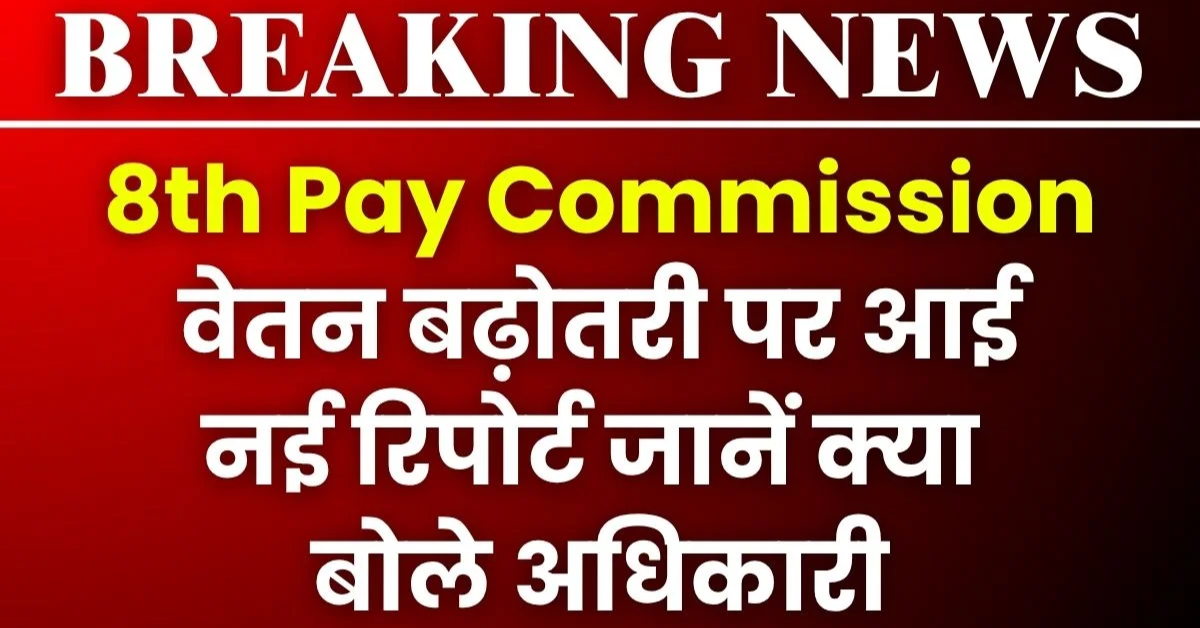The buzz around the 8th Pay Commission is getting louder with each passing month, especially as central government employees and pensioners eagerly wait for clarity on potential salary revisions. A recent report has added more weight to the speculation, and some government officials have also commented on what lies ahead. As the 7th Pay Commission continues to be the basis of current salary structures, expectations are building for a much-needed revision in the wake of inflation, rising living costs, and economic reforms.
In this blog, we break down the current status of the 8th Pay Commission, what the latest reports reveal, reactions from officials, and what employees can expect going forward.
What is the Pay Commission? A Quick Recap
The Pay Commission is a central body set up by the Government of India to review and recommend changes to the salary structure of central government employees, defense personnel, and pensioners. Since independence, there have been seven Pay Commissions, each usually formed every 10 years.
The 7th Pay Commission was implemented in 2016, and according to that timeline, the 8th Pay Commission should ideally be in the works by now to be implemented around 2026.
Why the Demand for the 8th Pay Commission is Rising
Several factors have led to the increasing demand for the formation and implementation of the 8th Pay Commission:
1. Inflation and Cost of Living
Over the past few years, inflation has risen steadily. Daily household items, fuel, healthcare, and education expenses have increased. Central government employees argue that the current salary structure doesn’t adequately reflect this rise.
2. Stagnant Salary Structure
Despite periodic revisions in Dearness Allowance (DA), the base pay and other allowances haven’t changed significantly since 2016. Employees feel the impact of long-term stagnation.
3. Increased Responsibilities
Government roles have expanded significantly in the last decade, especially with digital governance, implementation of welfare schemes, and administrative changes. Many believe that compensation should reflect this shift.
Latest Report on the 8th Pay Commission
Recently, a fresh report surfaced regarding the status of the 8th Pay Commission, indicating that informal discussions have already begun within the Ministry of Finance. The report claims that a new framework is being explored, including:
- A possible merit-based and performance-linked salary model
- Consideration of a revised fitment factor to increase basic pay
- Integration of DA hikes into base pay more frequently
While the government has not officially confirmed the constitution of the 8th Pay Commission, the emergence of such reports has increased speculation that something is brewing behind the scenes.
What Government Officials Are Saying
A few senior officials from the Department of Expenditure (Ministry of Finance) and Personnel Department have anonymously shared insights with news agencies:
✔️ “It’s too early to formally announce a commission. But given inflation and salary imbalance, we may look into a new structure within the next fiscal.”
✔️ “We are studying a model where annual increments are more dynamic and connected to productivity. The conventional 10-year gap may change.”
These remarks suggest that while there may not be a traditional Pay Commission as in the past, an alternative system or structure may soon be implemented that ensures timely revisions without waiting a full decade.
What is the Fitment Factor and Why It Matters
One of the most crucial parts of any Pay Commission is the fitment factor, which determines how much the basic pay is multiplied for revision.
In the 7th Pay Commission:
- The fitment factor was set at 2.57x.
- Employees are demanding it be raised to 3.68x, which would increase the minimum basic salary from ₹18,000 to around ₹26,000.
A change in this number has a direct impact on the take-home salary and pension benefits of lakhs of employees.
What Employees Can Expect from the 8th Pay Commission
Here are some possibilities based on reports and expert analysis:
✅ Higher Basic Pay
If the fitment factor is revised, the minimum pay could increase significantly, offering relief to lower and middle-income government staff.
✅ Performance-Linked Increments
The government may move toward a performance-based increment system, linking pay hikes to individual and departmental performance indicators.
✅ Timely DA Merger
There could be a provision for the frequent merging of DA into basic pay, improving the long-term benefits and pension calculations.
✅ Restructured Pension Model
The Pay Commission may also bring changes for pensioners under both Old Pension Scheme (OPS) and New Pension Scheme (NPS) to provide more stability post-retirement.
Challenges Ahead
While there’s growing support for the 8th Pay Commission, there are some hurdles as well:
- Fiscal Pressure: The government has to balance increased salaries with budgetary constraints.
- Political Sensitivities: With general elections around the corner, major salary reforms may have political implications.
- Implementation Timeline: Even if the commission is announced in 2025, implementation may not happen before mid-2026.
Conclusion
The 8th Pay Commission is still under discussion, but the signs are pointing toward positive developments for government employees. Recent reports and remarks by officials suggest that the government is aware of the growing concerns regarding salaries, and an announcement could be expected within the next year.
For now, employees will need to keep an eye on the Union Budget 2025 and official government circulars, which might shed light on the roadmap ahead. Whether it’s a traditional Pay Commission or a new salary review mechanism, one thing is certain—change is coming.



